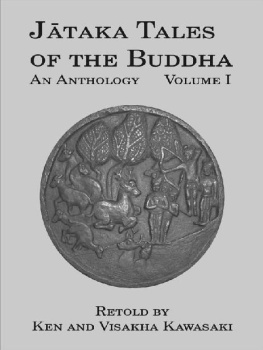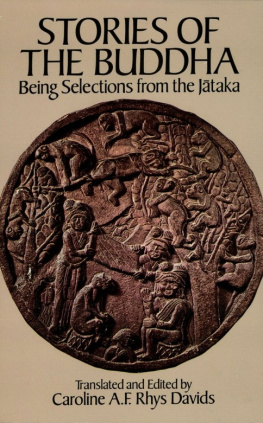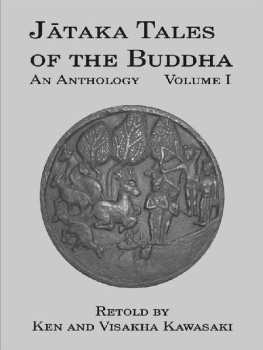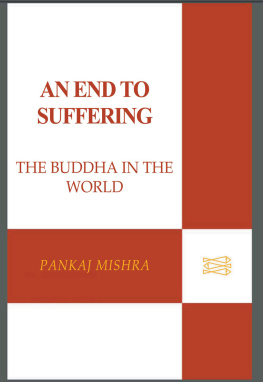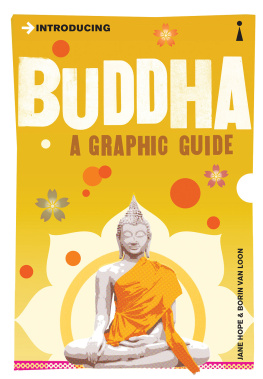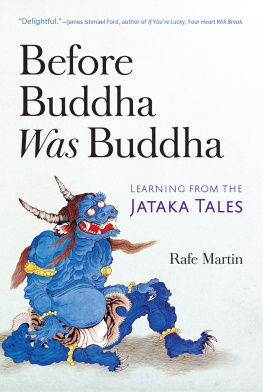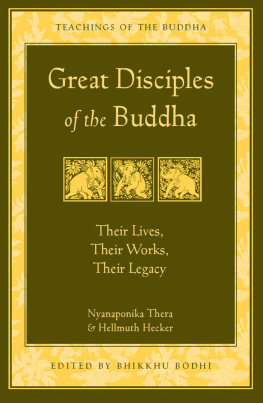Table of Contents
. Crossing the Wilderness Apannaka Jtaka
. Determination in the Desert Vannupatha Jtaka
. The Traders of Seriva Seri-Vnija Jtaka
. Carpe Diem Cullaka-Setthi Jtaka
. A Measure of Rice Tandulanli Jtaka
. Seeking Righteousness Devadhamma Jtaka
. The Wood Gatherers Son Katthahri Jtaka
. What Happiness! Sukhavihri Jtaka
. Leadership Lakkhana Jtaka
. The Pregnant Doe Nigrodha-Miga Jtaka
. The Wind Antelope Vta-Miga Jtaka
. The Goat That Laughed and Wept Matakabhatta Jtaka
. The Hollow Canes Nalapna Jtaka
. The Case of the Gnawed Leather Kukkura Jtaka
. Great Joy Nandivisla Jtaka
. The Adventures of Magha Kulvaka Jtaka
. The Dance of the Peacock Nacca Jtaka
. The Wages of Strife Sammodamna Jtaka
. The Slave of Passion Maccha Jtaka
. The Baby Quail Vattaka Jtaka
. The Morality of the Partridge Tittira Jtaka
. The Pit and the Lotus Khadirangra Jtaka
. Always Hungry Losaka Jtaka
. The Bamboo Viper Veluka Jtaka
. Long Root or Short? rmadsaka Jtaka
. The Sky Charm Vedabbha Jtaka
. The Sacrifice to End All Sacrifices Dummedha Jtaka
. Not One Drop of Blood Mah-Slava Jtaka
. Hero Without Equal Pacvudha Jtaka
. The Buttermilk Sage Takka Jtaka
. Husband, Brother, Son Ucchanga Jtaka
. A Log Pays a Better Return Saccankira Jtaka
. The Sixteen Dreams Mah-Supina Jtaka
. The Miserly Treasurer Illsa Jtaka
. The Would-Be Soldier Bhmasena Jtaka
. A Man Named Trouble Klakann Jtaka
. Omens in Cloth Mangala Jtaka
. The Straw Worth More Than Gold Kuhaka Jtaka
. Smeared with Poison Litta Jtaka
. The Queens Necklace Mahsra Jtaka
. A Bowl Full of Oil Telapatta Jtaka
. The Stone Slinger Slittaka Jtaka
. The Bran Cake Kundakapva Jtaka
. The Jackals Gold Sigla Jtaka
. The Warning Anussik Jtaka
. The Quails Strategy Vattaka Jtaka
. The Shaft of a Plow Nangalsa Jtaka
. Steadfastness Amba Jtaka
. The Imposter Kathaka Jtaka
. His Holiness Bilra Jtaka
. Ingratitude Asampadna Jtaka
. Feathers of a Golden Goose Suvanna-Hamsa Jtaka
. The Stonecutter and the Mouse Babbu Jtaka
. A Calamitous Day Ubhatobhattha Jtaka
. Crows Fat Kka Jtaka
. Bad Friends Godha Jtaka
. Shine in Your Might Virocana Jtaka
. Dousing the Birth-Fire Nanguttha Jtaka
. Emptying the Sea Kka Jtaka
. Trapped! Sigla Jtaka
. A Word of Advice Ekapanna Jtaka
. Raising the Dead Sajva Jtaka
. The Kings Virtues Rjovda Jtaka
. Delusions of Grandeur Skara Jtaka
. The Elephant Who Saved the Kingdom Alnacitta Jtaka
. One Good Turn Deserves Another Guna Jtaka
. On Dandaka Hill Mora Jtaka
. The Haughty Half-brother Vinlaka Jtaka
. The Pet Elephant Indasamnagotta Jtaka
. No Spot on This Earth Upaslha Jtaka
. Ones Own Territory Sakunagghi Jtaka
. The Tinduka Tree Tinduka Jtaka
. A Stick in the Mud Kacchapa Jtaka
. Ill-Gotten Gains Satadhamma Jtaka
. The Skilled Archer Asadisa Jtaka
. At Home on the Battlefield Sangmvacara Jtaka
. The Drunken Asses Vlodaka Jtaka
. A River of Curd Dadhivhana Jtaka
. A Good Friend Slnisamsa Jtaka
. Even After Drinking My Blood Culla-Paduma Jtaka
. The Jewel Thief Manicora Jtaka
. If She Is Dear Pabbatpatthara Jtaka
. Fetters Bandhangra Jtaka
. Gerophobia Kelisla Jtaka
. Three Good Friends Kurunga-Miga Jtaka
. The Dung-Beetle Queen Assaka Jtaka
. Give or Take an Ox Somadatta Jtaka
. Condemned by Your Own Words Kacchapa Jtaka
. Can Mice Eat Plowshares? Ktavnija Jtaka
. The Four Great Virtues Dhammaddhaja Jtaka
. A Violent End Culla-Nandiya Jtaka
. The Liberated Wife Asitbh Jtaka
. No Return Mah-Pingala Jtaka
. Subduing the World Sabbadtha Jtaka
. Maestro Guttila Guttila Jtaka
. The Wounded Ascetic Sankappa Jtaka
. For a Handful of Seeds Tilamutthi Jtaka
. Humble Fare Kundaka-Kucchi-Sindhava Jtaka
. The Kings Officer Gmani-Canda Jtaka
. Defeating the Golden Crab Kakkata Jtaka
. The Vanishing Jungle Vyaggha Jtaka
. The Kuru Virtue Kurudhamma Jtaka
. Monkeying Around Mahisa Jtaka
. Turning Misfortune Around Seyya Jtaka
. Stealing Luck Siri Jtaka
. The Wedding Feast Slka Jtaka
. The Seven-Cent Fish Macchuddna Jtaka
. The Wishing Cup Bhadraghata Jtaka
. In His Majestys Service Supatta Jtaka
. The Wolfs Fast Vaka Jtaka
Acknowledgments
Just before we left Japan on a world tour in 1978, our late friend Tove Neville took us to the Nara National Museum to view The Origins of Japanese Buddhist Art. Her brilliant commentary on this seminal exhibition led us to research and photograph Buddhist art as we traveled, which, in turn, introduced us to the Jtakas. For this we owe her a great debt of thanks. We were extremely grateful when, several months later, the kind monks residing at the MahBodhi Society in Sch opened the library for us. It was there, on those blazingly hot afternoons, that we first read the Jtakas. The inspiration for this book came from our first meditation teacher, Venerable U Khe Min Da Saydaw of the World Peace Pagoda in Moji, Kita-Kyushu , Japan . Thoroughly versed in Pali and, thanks to his Methodist teachers in Burma , fluent in English, he wove the Jtakas into his teaching and instilled in us a love for the tales.
We must thank Venerable Bhikkhu Bodhi, the President and former Editor of Buddhist Publication Society, who accepted our first efforts at retelling the Jtakas for publication as Bodhi Leaves and encouraged us to continue. For his invaluable assistance with difficult Pali terms, we must thank the current editor of the BPS, Venerable Nyanatusita.
Special gratitude goes to Venerable nandajoti, who read, corrected, and critiqued the entire manuscript with both goodwill and good humor.
We appreciate the many hours Charles Munasinghe spent patiently translating our discussions with Mr. Dharmawardena, the Sinhalese artist who illustrated each story.
Finally, we wish to thank Judy Caughley and Cynthia Thatcher for their careful proofreading of the manuscript.
Ken and Visakha Kawasaki
Preface
The word jtaka literally means connected to a former rebirth and is usually translated as birth-story. Jtaka is also the name of one of the books in the Pali Tipitaka, the canon of sacred scriptures of Theravda Buddhism. In some ways, the Jtaka collection is the most complex, the most interesting, and the most readable part of all Buddhist literature. It is made up entirely of verses, about 2500 altogether, to which stories have been added in the Jtaka Commentary, the Jtaka-atthakath. Each story consists of four parts:
1. The Story of the Present ( paccuppanna-vatthu ) This recounts some event in the life of the Buddha which prompted him to tell the Jtaka story. Some of these events are mentioned in the Tipitaka itself, but many are not.

